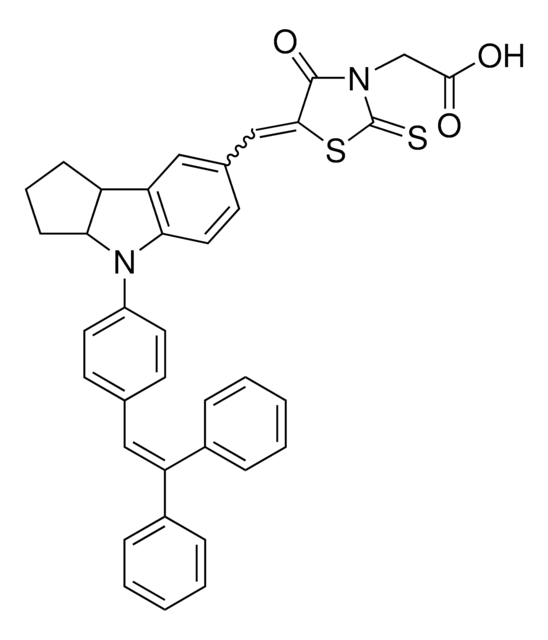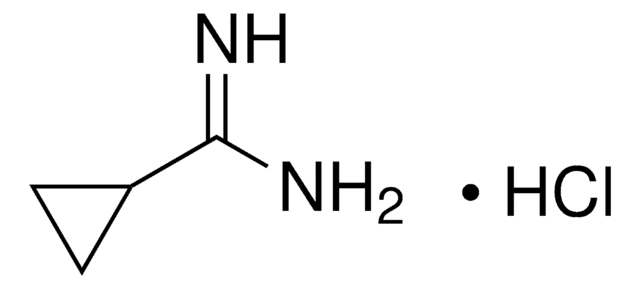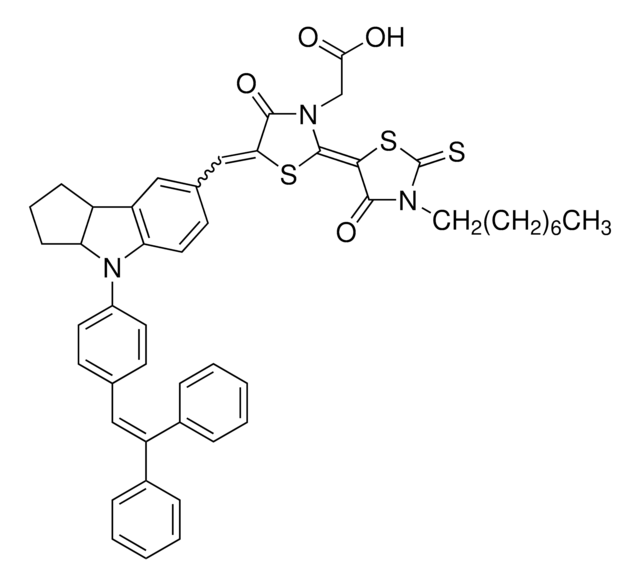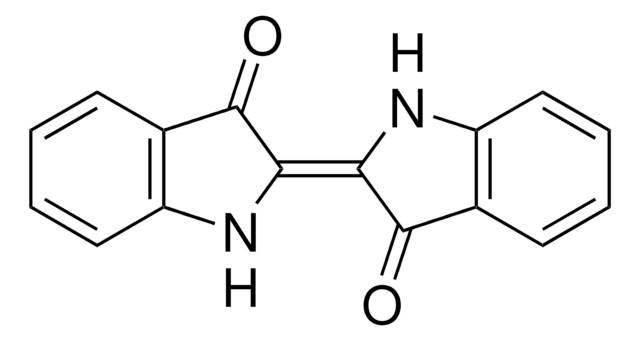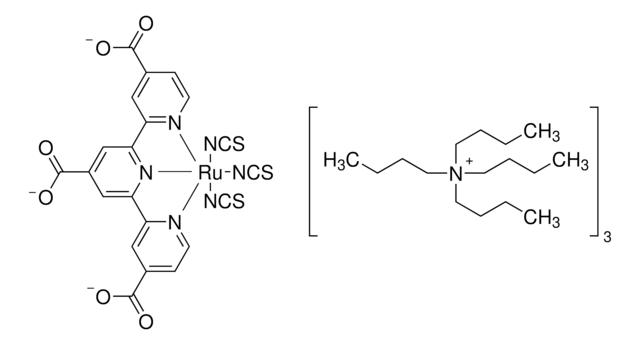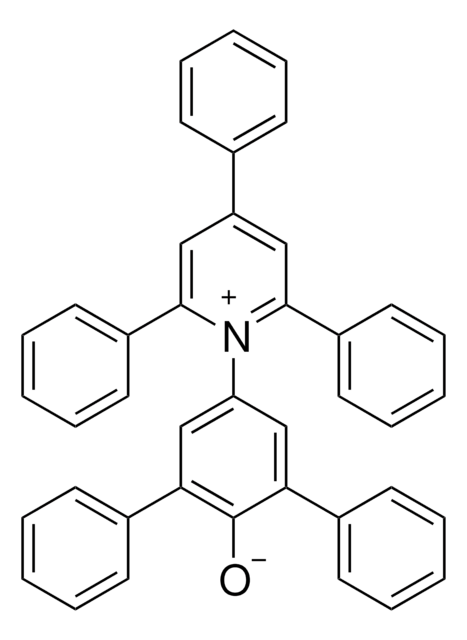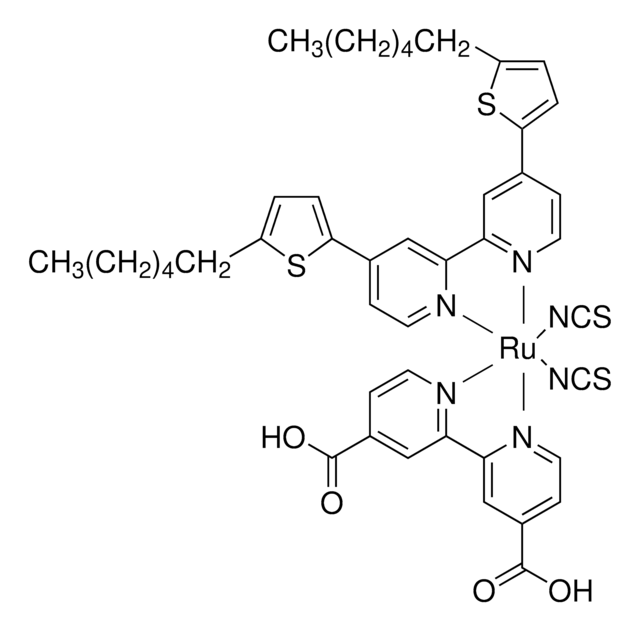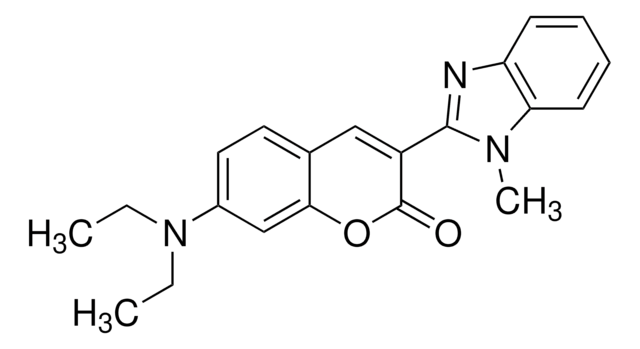736015
D149 Dye
98% (HPLC)
Synonym(s):
5-[[4-[4-(2,2-Diphenylethenyl)phenyl]-1,2,3-3a,4,8b-hexahydrocyclopent[b]indol-7-yl]methylene]-2-(3-ethyl-4-oxo-2-thioxo-5-thiazolidinylidene)-4-oxo-3-thiazolidineacetic acid, Indoline dye D149, Purple Dye
About This Item
Recommended Products
Assay
98% (HPLC)
form
solid
mp
284-289 °C
λmax
531 nm
SMILES string
CCN1C(=S)SC(\C1=O)=C2\SC(=C/c3ccc4N(C5CCCC5c4c3)c6ccc(cc6)\C=C(\c7ccccc7)c8ccccc8)\C(=O)N2CC(O)=O
InChI
1S/C42H35N3O4S3/c1-2-43-40(49)38(52-42(43)50)41-44(25-37(46)47)39(48)36(51-41)24-27-18-21-35-33(23-27)31-14-9-15-34(31)45(35)30-19-16-26(17-20-30)22-32(28-10-5-3-6-11-28)29-12-7-4-8-13-29/h3-8,10-13,16-24,31,34H,2,9,14-15,25H2,1H3,(H,46,47)/b36-24-,41-38+
InChI key
OZFUEQNYOBIXTB-SJIUXOFISA-N
General description
Application
Jsc(mA/cm2) = 14.05
Fill factor − ff − 0.67
Efficiency − η − 6.67
Cell area: 0.25 cm2 (0.5 cm × 0.5 cm)
TiO2 Thickness: 5 μm
FTO glass: AGC Fabritec A11DU80
TiO2: screen printing (Catalysts & Chemicals IND. Co., Ltd.
PST−18NR/400C (4/1 mixture paste)
Electrolyte; 0.1 M LiI; 0.05 M I2; 0.6 M Dimethylpropylimidazolium
Iodide; 0.05 M t-Butylpyridine in 3-Methoxypropionitrile
Light source: AM1.5 1sun
Counter Electrode: Pt/Cr spatter glass
Dye adsorption: 30 °C/ in 3 hr. (t-BuOH/acetonitrile soln.)
Storage Class Code
11 - Combustible Solids
WGK
WGK 3
Flash Point(F)
Not applicable
Flash Point(C)
Not applicable
Regulatory Listings
Regulatory Listings are mainly provided for chemical products. Only limited information can be provided here for non-chemical products. No entry means none of the components are listed. It is the user’s obligation to ensure the safe and legal use of the product.
JAN Code
736015-VAR:
736015-BULK:
736015-100MG:
Choose from one of the most recent versions:
Already Own This Product?
Find documentation for the products that you have recently purchased in the Document Library.
Customers Also Viewed
Articles
Dye-sensitized solar cells (DSCs) are 3rd generation solar cells combining the promise of high efficiency with low production costs.
While dye sensitization as the basis for color photography has been accepted for a very long time,1 attempts to use this principle for the conversion of solar light to electricity generally had resulted only in very low photocurrents, below 100 nA/cm2.2
Our team of scientists has experience in all areas of research including Life Science, Material Science, Chemical Synthesis, Chromatography, Analytical and many others.
Contact Technical Service
